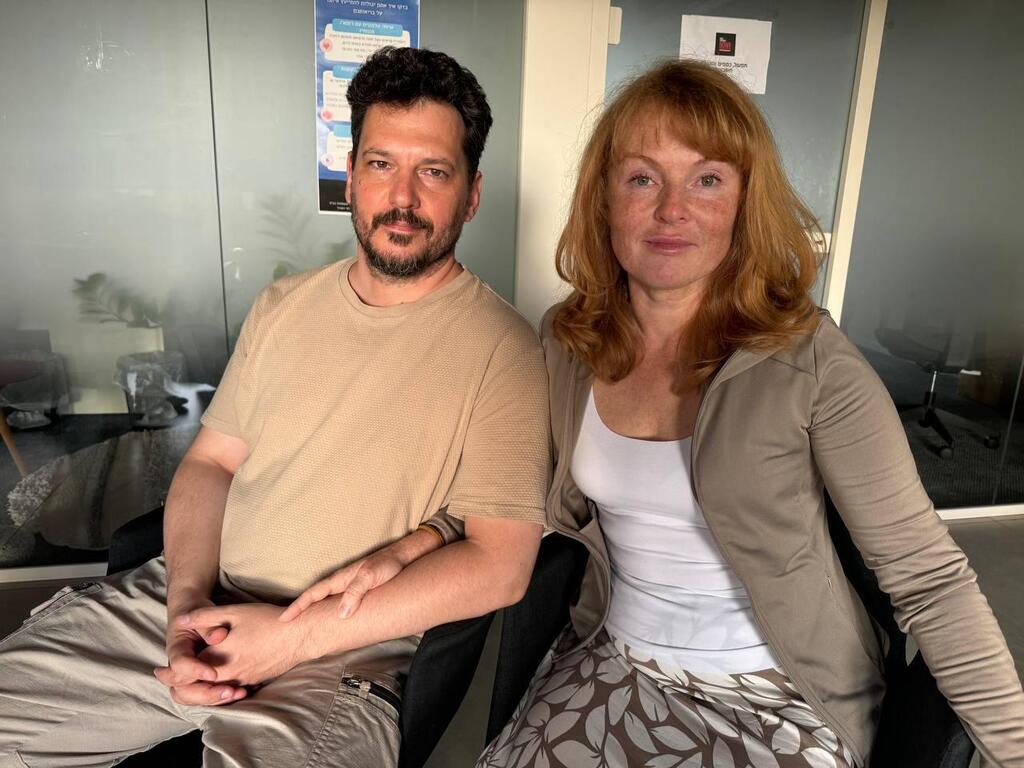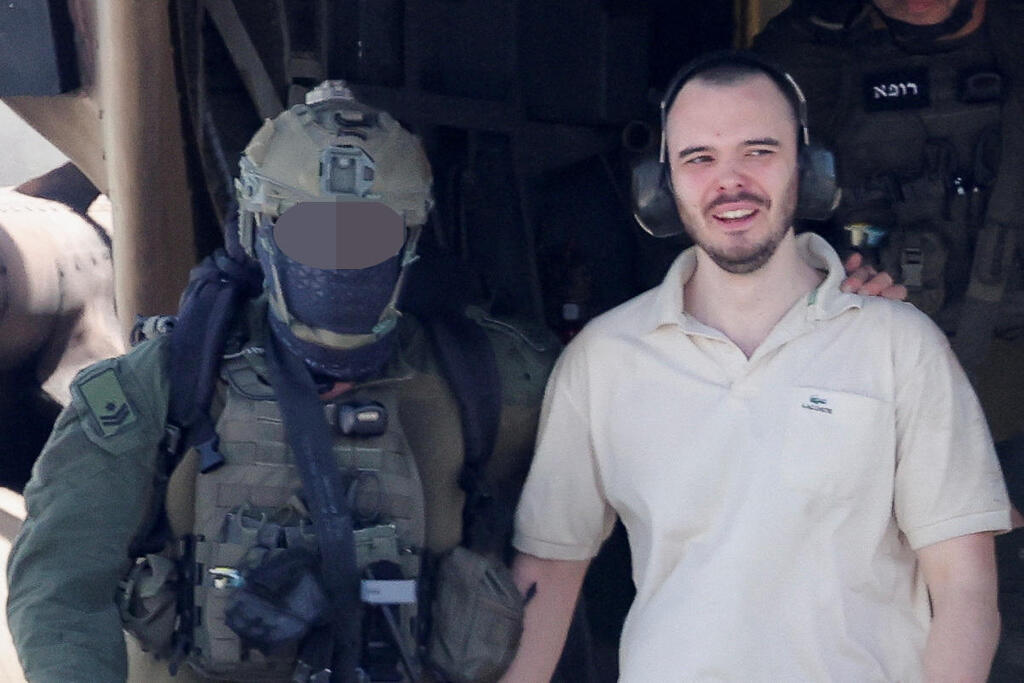Getting your Trinity Audio player ready...
Two days after arriving in Israel following the heroic rescue of their son, Andrey Kozlov, as part of Operation Arnon, his parents, Evgeniia and Mikhail, shared in an exclusive interview with Ynet some details about his ordeal in captivity, how he survived the prolonged physical and mental abuse, his current condition and why they chose to tell their son's story while 120 hostages remain in Hamas captivity.
Andrey's parents are Russian speakers, and the interview was conducted Tuesday with the help of a translator at the Hostage and Missing Families Forum headquarters in Tel Aviv.
Andrey was abducted on October 7 from the Nova music festival in Kibbutz Re'im, where he worked as a security guard. He was rescued along with Noa Argamani, 25, Almog Meir Jan, 21, and Shlomi Ziv, 40, in a special operation by security forces last Saturday, after 246 days in Hamas captivity.
During the heroic rescue operation, Yamam commander Chief Inspector Arnon Zmora was killed. The hostages were taken to Sheba Medical Center outside Tel Aviv, where the IDF reported that their medical condition was stable.
How is Andrey? How is he feeling now?
Evgeniia: "Excellent (laughs). He feels fine, there are no physical changes, he is healthy. Fortunately, his mental state also seems fine. He enjoys talking, joking, laughing and entertaining those around him. Of course, he hasn't fully regained his previous emotional balance, but I am confident that he is young and healthy enough to recover quickly. He is recovering."
Did he share what he went through during those months?
Mikhail: "He shared a lot about how he was kidnapped and how he spent his time in Gaza. He has many stories about these events. But he spares us and tells them with humor, as he tries to find something amusing in everything that happened to him and presents it in a way that we can find entertaining."
Mikhail continued, recounting Andrey's experience during the music festival. "We all saw the videos from there. He was part of those events, witnessed everything firsthand and felt as helpless as the other partygoers. He was working there as a security guard on a temporary job. When the rocket barrages started, he managed to write in our family group chat that everything was fine. But after a while, about half an hour to an hour later, they all realized they were surrounded by terrorists and began trying to find a way to escape, running from side to side.
Andrey Kozlov meets his parents for the first time after being rescued from captivity
"He ran through the same field others were running through, which we saw in the published videos. He encountered terrorists, tried to return to the vehicle and then ran with another guy toward a creek. He managed to jump into the creek, but the guy running behind him didn't make it. He showed us a scar from falling on a bush in the creek; he has a scar on his hand.
"Later, he saw one of the guys who would be with him in captivity. He was in a similar situation. Here, Andrey tells a story that became a joke among the terrorists because they forced the other guy to drive the terrorists' pickup truck. The terrorist who kidnapped them made the second captive drive the vehicle with Andrey in it to Gaza. The terrorists later called this second captive 'the Al-Qassam driver.'"
What was it like during his time in the apartment in Gaza? What were the conditions like?
Evgeniia: "I felt real pain from one of the sentences Andrey said: 'We experienced things that I will never tell you.' He told us that for two months, they were tied up by their hands and feet. In the first weeks, their hands were tied behind their backs, and after they started tying their hands in front, they joked it was a gift from the terrorists.
"In other cases, they had to relieve themselves in a bucket. The terrorists engaged in psychological abuse, constantly telling each captive, 'Israel has forgotten you,' 'Israel wants to get rid of you,' 'Your mother went on vacation to Greece; we saw it on the news,' 'Your wife is dating someone else,' 'Your children are doing nothing.' They even said, 'Be quiet because Israel is listening and wants to kill you. You are a problem for Israel, and it is much easier to solve this by killing you than rescuing you.' These were the things they endured, and it's unbearable to hear this."
Mikhail added, "The psychological abuse was so intense that when the IDF and security forces began the operation to rescue the hostages, Andrey initially didn't know why they had come. He thought they might be there to kill him. It was only when he realized they were there to rescue them that he felt immense relief."
Did he share what kept him going during this time?
Mikhail: "Without a doubt, the fact that Andrey was not alone, but with two others, helped all of them, especially him. He felt their support, and I hope the shared experiences they went through will bond them forever. I also understand that he survived because he is a strong person. He has an incredible internal reservoir of energy that we didn't know existed. We didn't think that after everything, we would get Andrey back as he was. We thought he would change, but after seeing him and talking to him for two days, we realized he hadn't really changed. He is the same Andrey we knew."
Why did you decide to give an interview now? You must be under a lot of pressure, and I assume all you want to do is be with Andrey.
Mikhail: "You're the first to ask this, and I'm surprised, though it's a natural question. We are speaking out and giving interviews not to show how happy or well we are. We are trying to raise the issue again so that the remaining hostages in Gaza can be freed. We need good news, and all avenues to free them must be explored, whether it's through a deal or an operation like the one that saved Andrey. Despite our desire to be with Andrey, we can't allow ourselves that luxury because we must continue the work that my wife, Evgeniia, and I have been doing since I arrived in Israel. We must help free the other hostages."
Evgeniia: "It's important to remember how significant this operation is for all of Israel. June 8 has become a day of celebration. All Israelis want to share in our happiness, as if we've become part of them, part of their family. They are all so happy for us. When we're on the street and Andrey is with us, people shout from their cars, 'We're so glad you're back! We're so happy for you!' They shout this to him, to us. It's amazing. We must share our joy with the entire nation because people haven't heard good news in a long time. We want to show how grateful we are to the IDF and all the security forces who conducted this heroic operation.
Helmet camera footage: Israel Police commandos rescue hostages from Gaza amid heavy fire
(Video: Israel Police)
"Everything I’ve discovered in recent days and heard from Andrey deeply moves me, especially the bravery of those who planned the operation, fought and protected them. Andrey was also very emotional. He said that when he held onto the soldiers' uniforms or hands, he felt he was beside true heroes. For him, they are superheroes who fear nothing. He said he felt completely safe walking with them, and in the helicopter, everyone kept coming to him, saying, 'Everything is okay now,' 'We're rescuing you,' 'We're with you,' 'You are a hero' – but the real heroes are truly them."
Evgeniia added, with tears: "I want to thank from the bottom of my heart all those involved in the operation to free my son. I want to extend a huge thank you to everyone who helped us search for him and fight for his release. I am grateful to Andrey's girlfriend, Jennifer, who never lost hope, and we helped each other believe he would return and be okay.
"I also want to extend my condolences to the family of Chief Inspector Arnon Zmora, who fell in the line of duty. To his mother and father, his wife and his young children – I am not one to cry often, but when I learned that Andrey was saved and the next day found out that Arnon had fallen in battle, I cried deeply. I feel compelled to do something for his family. I don't know how to choose the right words – there are no words that fit. 'Condolences?' 'Thank you?' The loss of a son, a husband, a father – it's something no one can understand or describe. Their son is a superhero; his profession was to be a hero, and I have never known people like them, but they are the reason Israel stands. They are the national pride of Israel. They create the Hebrew, Israeli ethos. I am so grateful to him and feel guilty before his family."







